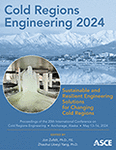Seismic Resilience Framework for Arctic Infrastructure in Alaska: Integrating Climate Stressors for Enhanced Decision Making and Adaptation Strategies
Publication: Cold Regions Engineering 2024: Sustainable and Resilient Engineering Solutions for Changing Cold Regions
ABSTRACT
In the world’s cold regions, Alaska stands as a highly seismic area with extensive permafrost coverage. Climate change has stimulated warming heightening infrastructure resilience challenges. To address these challenges, this study introduces an integrated seismic resilience framework. It employs a transdisciplinary approach, incorporating climate stressors through system dynamic models (SDM) that capture complex interactions that are difficult to be mathematically described. Furthermore, the outcome of a series of key informant interviews and an international workshop are employed to validate and expand the model. The results could lead to a policy space with two primary objectives: First, by integrating climate stressors, decision-makers can proactively consider the long-term impacts of changing environmental conditions and develop adaptive strategies to ensure infrastructure sustainability. Second, the SDM serves as a decision support tool, enabling stakeholders to understand the complex dynamics of Arctic systems and make informed choices to strengthen infrastructure resilience.
Get full access to this chapter
View all available purchase options and get full access to this chapter.
REFERENCES
Adger, W. N., Barnett, J., Heath, S., & Jarillo, S. (2022). Climate change affects multiple dimensions of well-being through impacts, information and policy responses. Nature Human Behaviour, 6(11), 1465-1473.
Alessa, L., Valentine, J., Moon, S., McComb, C., Hicks, S., Romanovsky, V., & Kliskey, A. (2023). Toward a Permafrost Vulnerability Index for Critical Infrastructure, Community Resilience and National Security. Geographies, 3(3), 522-542.
Capacci, L., & Biondini, F. (2021). Resilience-based seismic risk assessment of aging bridge networks under climate change. In Bridge Maintenance, Safety, Management, Life-Cycle Sustainability and Innovations-Proceedings of the 10th International Conference on Bridge Maintenaince, Safety and Management, IABMAS 2020 (pp. 2085-2093). CRC Press/Balkema.
Chythlook, C., Rudolf, M., Biermann, M., Eicken, H., & Starkweather, S. (2022). Research networking activities support sustained coordinated observations of Arctic change.
FEMA (2023). National Risk Index for Natural Hazards. https://www.fema.gov/nri
Ghayoomi, M., Duderstadt, K. A., Kholodov, A., Shiklomanov, A., Turner, M. M., & Ajorlou, E. (2022). Seismic Resilience of Arctic Infrastructure and Social Systems: 1st international workshop. The Polar Journal, 12(1), 172-176.
Ghayoomi, M., Duderstadt, K., Kholodov, A., Shiklomanov, A., Turner, M., & Ajorlou, E. (2021). Workshop Outcomes Report: 1st International Workshop on Seismic Resilience of Arctic Infrastructure and Social Systems. https://scholars.unh.edu/faculty_pubs/1375
Green, K. M., A. H. Beaudreau, M. K. Lukin, & L. B. Crowder. (2021). Climate change stressors and social-ecological factors mediating access to subsistence resources in Arctic Alaska. Ecology and Society 26(4):15.
Maani, K. (2020). System Dynamics and Organizational Learning. System Dynamics: Theory and Applications, 417-430.
Mishra, V., & Sadhu, A. (2022). Towards the effect of climate change in structural loads of urban infrastructure: A review. Sustainable Cities and Society, 104352.
NOAA National Center For Environmental Information (2023). Climate Data Online. https://www.ncei.noaa.gov/cdo-web/
Povoroznyuk, O., Vincent, W. F., Schweitzer, P., Laptander, R., Bennett, M., Calmels, F., & Walker, D. A. (2022). Arctic Roads and Railways: Social and Environmental Consequences of Transport Infrastructure in The Circumpolar North. Arctic Science, 9(2), 297-330.
Robards, M. D., Huntington, H. P., Druckenmiller, M., Lefevre, J., Moses, S. K., Stevenson, Z., … & Williams, M. (2018). Understanding and adapting to observed changes in the Alaskan Arctic: Actionable knowledge co-production with Alaska Native communities. Deep Sea Research Part II: Topical Studies in Oceanography, 152, 203-213.
Sterman, J. (2010). Business dynamics (p. 982). Irwin/McGraw-Hill c2000.
Stern, G. A. & Gaden, A. (2015). From Science to Policy in the Western and Central Canadian Arctic: An Integrated Regional Impact Study (IRIS) of Climate Change and Modernization. ArcticNet, Quebec City, 432 pp.
Turner M. M., Ghayoomi M., Duderstadt K., Brewer J., & Kholodov A. (2023) Climate Change and Seismic Resilience: Key Considerations for Alaska’s Infrastructure and Built Environment. PLoS ONE 18(10): e0292320.
Information & Authors
Information
Published In
History
Published online: May 9, 2024
ASCE Technical Topics:
Authors
Metrics & Citations
Metrics
Citations
Download citation
If you have the appropriate software installed, you can download article citation data to the citation manager of your choice. Simply select your manager software from the list below and click Download.
